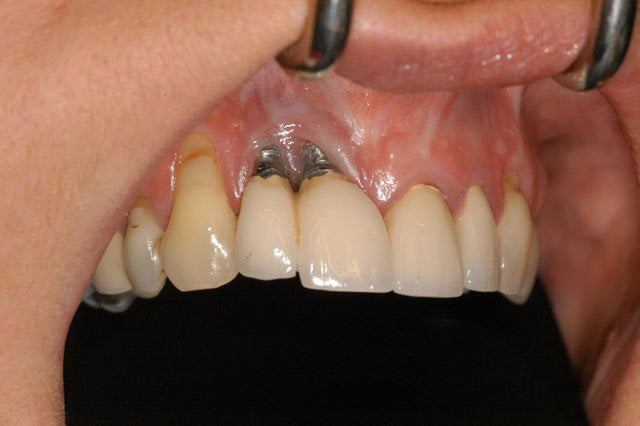A dental implant infection, also known as peri-implantitis, is a serious complication that can occur after dental implant surgery. Peri-implantitis is an inflammatory condition that affects the tissues around a dental implant, including the gum (gingiva) and the bone that supports the implant. If left untreated, it can lead to the loss of the implant and may cause damage to surrounding structures.
What is a dental implant infection?
A dental implant infection is a bacterial infection that can occur after a dental implant surgery. Symptoms of an implant infection include pain, swelling, and redness in the gums or around the implant site.
Recognizing the Signs and Symptoms
Symptoms: Common symptoms of a dental implant infection may include:
- Redness and swelling of the gum tissue around the implant.
- Pain or discomfort in the implant area.
- Bleeding when brushing or flossing around the implant.
- Pus or discharge around the implant.
- Mobility or loosening of the implant.
- Changes in the appearance or position of the implant restoration (crown, bridge, or denture).
Ex moreplore: Dentures cleaner process.
Causes and Risk Factors
Diagnosis of peri-implantitis is typically made through a clinical examination by a dentist or periodontist. X-rays or other imaging may be used to assess the extent of bone loss around the implant.
Prevention and Oral Hygiene Tips
Treatment of a dental implant infection often involves a combination of the following approaches:
- Improved Oral Hygiene.
- Scaling and Root Planing
- Antibiotics.
- Surgery.
- Implant Removal.
-

“What is a dental implant infection?”
How to treat dental implant infections
If you suspect you have a dental implant infection, it is important to see your dentist or oral surgeon as soon as possible.
Ex moreplore: Dentures repairs near me.
Antibiotics and Other Medications
In addition to antibiotics, your dentist or oral surgeon may also recommend pain relievers or anti-inflammatory medications to help manage any discomfort or swelling you may be experiencing.
It is important to take all medications as prescribed and to finish the entire course of antibiotics, even if you start to feel better before the medication is finished. This will help ensure that the infection is fully treated and does not come back.
Surgical Intervention Options
In cases where antibiotics and other medications are not effective or the infection is severe, surgical intervention may be required. This may involve removing the implant and cleaning the area thoroughly to remove any infected tissue. In some cases, a bone graft may be needed to help support the jawbone and prepare it for a new implant.
What to Expect During Implant Infection Treatment
If you have a dental implant infection, your dentist or oral surgeon will work with you to develop a treatment plan based on the severity of your infection and your overall health.
Diagnosis Your dentist or oral surgeon will examine your implant and the surrounding tissue to determine if you have an infection.
Antibiotics If you have a mild infection, your dentist or oral surgeon may prescribe antibiotics to help fight the infection.
Removal of the implant the infection is severe or antibiotics are not effective, your dentist or oral surgeon may need to remove the implant.
Follow-up care treatment for a dental implant infection, Your dentist or oral surgeon will provide you with instructions on how to care for your mouth as it heals.
Seemore: What is dentures with snaps?
-

“What to Expect During Implant Infection Treatment”
Preventing Dental Implant Infections
While dental implant infections can be treated with antibiotics and other interventions, it is always better to prevent them from occurring in the first place:
Practice good oral hygiene:
Brush your teeth twice a day and floss daily to remove bacteria and plaque from your teeth and gums. Use an antiseptic mouthwash to kill any remaining bacteria in your mouth.
Quit smoking:
Smoking can increase your risk of developing infections and slow down the healing process after surgery. If you smoke, talk to your doctor about ways to quit.
Follow aftercare instructions:
After your implant surgery, your dentist or oral surgeon will provide you with instructions on how to care for your mouth as it heals. Follow these instructions carefully to prevent infections and promote healing.
See your dentist regularly:
Schedule regular check-ups and cleanings with your dentist to monitor the health of your mouth and detect any problems early.
-

“Preventing Dental Implant Infections”
Learn More About Implant Dentistry
When you choose Dentist For Life, you’re choosing a dental practice that’s dedicated to your long-term health and happiness. We’re here to help you achieve and maintain a smile that lasts a lifetime. Welcome to a lifetime of smiles with Dentist For Life.
Our team of dedicated dental professionals is passionate about delivering exceptional dental care that goes beyond the basics. We believe that your journey to optimal oral health should be marked by personalized attention, advanced techniques, and a welcoming environment that puts you at ease.



